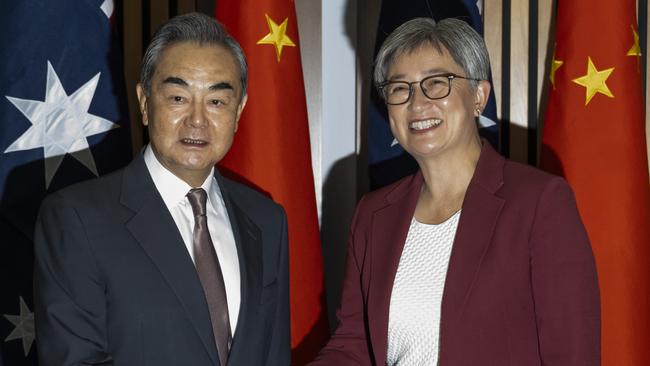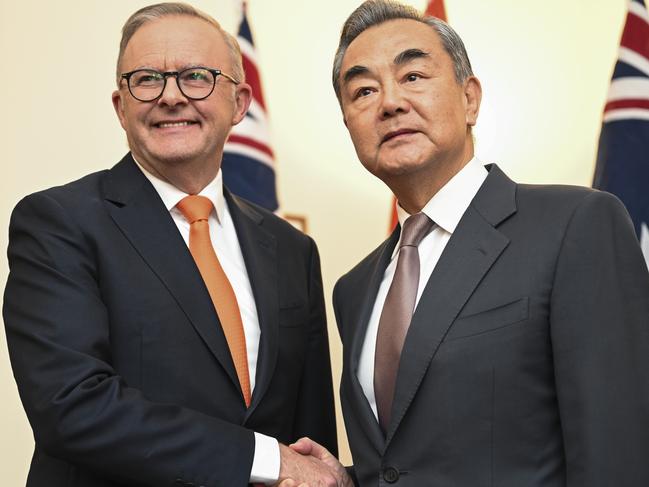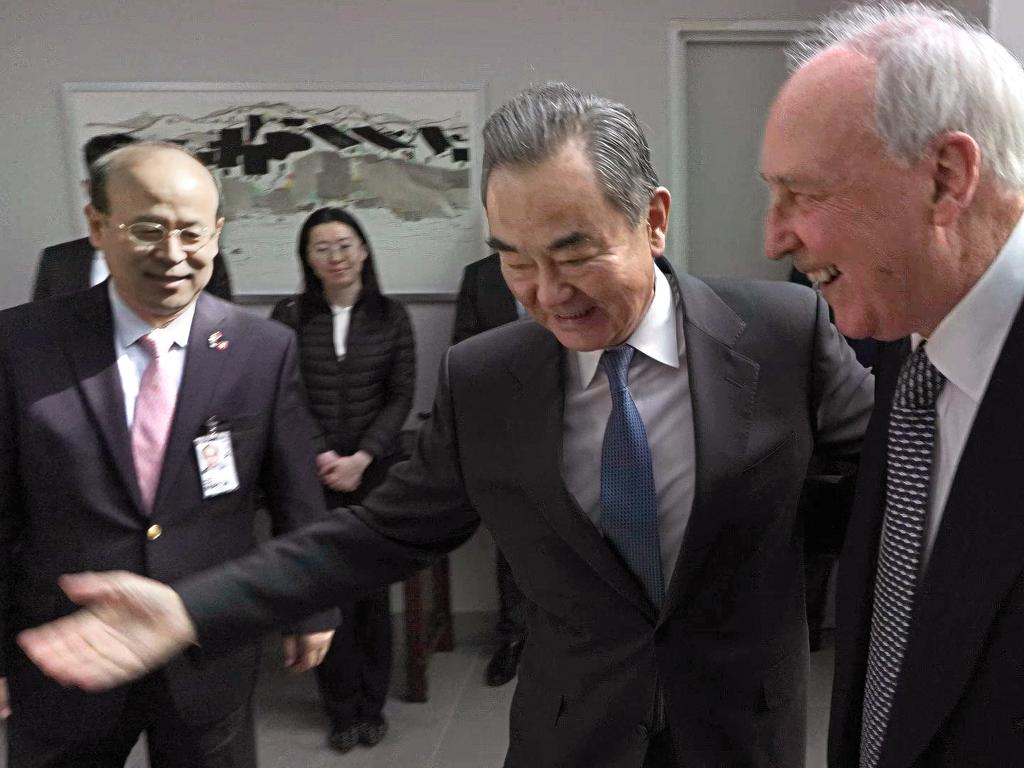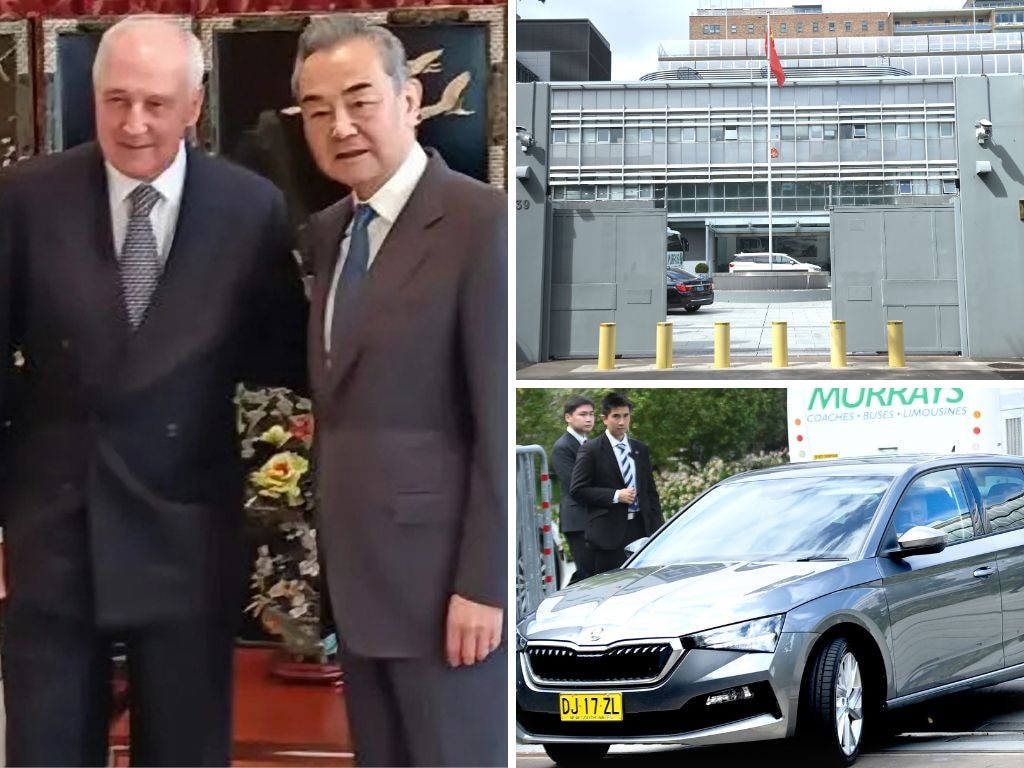The truth about Australia’s ‘stabilised’ relationship with China
When Beijing is openly preparing to attack Taiwan, endlessly bullying countries into political submission and undermining US alliances in Asia, it takes a special type of Australian diplomacy to pretend bilateral relations are improving.

Penny Wong’s meeting with Chinese Foreign Minister Wang Yi this week was full of the empty phrases that are the hallmark of Labor’s bilateral diplomacy.
Most prominent were variations of Anthony Albanese’s oft-repeated line that “Australia will co-operate where we can and disagree where we must” with China.
Wong has added: “China will always be China and Australia will always be Australia”, a statement that says nothing about the content or direction of policy.
She showed some spine in making clear to Wang areas of concern: Beijing’s human rights violations, sentencing Australian Yang Hengjun to the death penalty on fake espionage charges and China’s aggressive maritime behaviour in the South and East China seas. It could not be clearer, though, that none of those actions creates any pause or impediment to Labor claiming a stable and constructive relationship with China.

Early this month, Trade Minister Don Farrell was reported telling The Australian Financial Review that Beijing’s espionage and political interference in Australia would not prevent the resumption of wine and lobster exports to China “because trade and security issues were typically largely siloed”. This gets to the essence of Labor’s approach. Beijing’s bullying, its threats to punish Australia if we don’t acquiesce to its aims, its open attempts to shut down criticism, its cultivation of local useful idiots and appeasers, its spying, its military aggression, its open contempt of our society, history and democratic processes – none of these things will get in the way of Australia pursuing Chinese money through trade.
Thus the high policy outcome of Wang’s visit is, as Wong described, “I think we’re on a good path there to continued panda presence” at Adelaide Zoo. “And I did say to the Foreign Minister that my children would be very pleased.” Wang would be pleased, too, and even more delighted at Farrell’s hapless, historically uninformed and profoundly politically inept statement in the Senate on Monday: “I’m not sure the United States is our most trusted ally … I would have said our closest international ally is New Zealand.”
What a gift to hand to Wang at the start of his visit given a Chinese strategic goal is to weaken Australian military co-operation with the US and to build opposition to the AUKUS arrangement providing Australia with nuclear-powered submarines.
Wong’s panda pleasure was perhaps reduced by Wang’s private meeting with Paul Keating, a vociferous Labor critic of Wong’s foreign policy and of Albanese’s support of AUKUS. Wong was measured and undoubtedly correct in saying Keating was “entitled to his views”, but clearly China sees its engagement with Keating as a way to influence Labor Party opinion in Australia.
No Australian government should tolerate the open disrespect with which Wang has conducted this visit. If Wong visited Beijing there would be no possibility she could have held a private meeting with a vocal critic of the ruling party – such people “disappear” in Xi Jinping’s China. She would need to visit a prison to find such a critic. Wong would not be able to avoid meeting the party-controlled media in the way Wang skipped a Canberra press conference to instead lunch with hand-picked Australian policy commentators in the Chinese embassy, including Hugh White, a leading AUKUS critic.
It is a mystery to me why Australia and so many other countries tolerate such high-handed behaviour from visiting Chinese officials, typically slighting a free media and making unreasonable demands for VIP treatment. Beijing’s demands on these visits aim to cement a relationship between cultural superiors and barbarian subordinates. Communist China’s pretension to such pre-eminence undermines any claim these bilateral gatherings are meeting of respected equals.
In her public opening remarks Wong asserted: “Now more than ever, it is important that we have channels to discuss upholding a regional and global order shaped by agreed rules and norms, where we each respect each other’s sovereignty.” Wong surely must realise there is not one scintilla of belief in Beijing’s ruling Communist Party elites that China respects Australia’s sovereignty.
The same is true of Beijing’s view of New Zealand’s sovereignty, of Papua New Guinea’s and, indeed, the sovereignty of any country. In the world view of the CCP, Australia is simply a subordinate player in the region whose will should be bent to support the party’s aims to be the dominant power.
China aims to make Australia a client state by building ties of economic dependency that undercut our political sovereignty and pry us away from security co-operation with the US, Japan and other like-minded countries, whose values we share. China has successfully used the power that came from its once-flourishing economy to buy influence through trade and investment. Where commerce fails to achieve the party’s strategic goals, coercion, threats and elite cooption will do just as nicely. Australians look at the growing influence of Chinese “money power” in places such as Solomon Islands and in Africa but seem surprised at the proposition that such influence-buying happens in our own country. We should think again.
Ultimately, the Albanese government’s obsessive pursuit of taking Australia back to an abusive relationship with communist China is deeply damaging to our national interests. Wong should feel free to pursue as many dialogues with her Beijing counterparts as can be tolerated given the pointlessness of trying to sustain a genuine discussion with communist cadres who cannot depart from the party line.
While maintaining the fiction of “co-operate where we can and disagree where we must”, the Albanese government should be pushing hard to build different markets for Australian exports, quietly advise businesses to divest their interests in mainland China, and prepare the country for more difficult strategic times to come.
Beijing has no interest in “upholding a regional and global order shaped by agreed rules and norms”, as Wong piously called for this week. In fact, the opposite is true: China is out to reshape the global order in its own image.
It suits Wang and Xi to keep as many well-minded democracies as possible focused on the false hope that some day there will be a sea change in Chinese diplomacy when Beijing will accept its place as a productive member of the current global order.
Note that Beijing is doing nothing that suggests this change will occur. On the contrary, an accelerated military build-up, full-on cyber attacks, espionage, sabotage plans directed against critical infrastructure and relentless political propaganda all point in the opposite direction.
Australians should be concerned at media reports this week that the heads of our key intelligence agencies have been told their attendance at national security committee of cabinet meetings is now by exception rather than the norm. It’s regrettably clear the Albanese government is so focused on staying on message about achieving a stabilised relationship with China that any perspective pointing to the hollowness of this claim is no longer welcome.
A footnote on Keating’s meeting with Wang on Thursday. The Guardian reported on Monday: “Keating said he had also received a communication from the Australian Department of the Prime Minister and Cabinet ‘offering to facilitate the meeting and to make appropriate arrangements’.”
That offer was not simply for the former prime minister’s convenience but also to make sure he could meet in a location where his comments might not be privately recorded. Note that Keating in fact met Wang at the Chinese consulate in Sydney. Why did he decline PM&C’s offer to facilitate?
Was the meeting recorded? Was an Australian official in attendance? Will a record of the meeting be released? Keating would surely want us to know the detail of his exchange with Wang.
We have seen only a few seconds of Chinese television coverage in which Keating is reported to have said that China “did not pose a threat to other countries”. Australian media was left at the Consulate gates. Keating should be ashamed to be treated as a prop in China’s propaganda coverage of Wang’s visit.
Did Keating hand over a mobile phone or laptop, as is often requested when meeting in a secure room in an embassy or consulate? What were the arrangements for those Australians meeting Wang at China’s embassy in Canberra?
At her solo press conference in Canberra, Wong repeatedly stressed the value of dialogue with China: “They enable – the face-to-face discussion is – it’s not just, you know, having a discussion, it’s actually understanding where both sides are coming from.”
In the interests of showing, “you know”, where everyone is coming from, China should release the record of Wang’s private discussions with Australians this week from behind the closed doors of its diplomatic compounds. It won’t do that. The truth is neither our government nor its Chinese counterpart has any interest in public openness about our “stabilised” relationship.








When Beijing is openly preparing to attack Taiwan, endlessly bullying countries into political submission and undermining US alliances in Asia, it takes a special type of Australian diplomacy to pretend bilateral relations are improving and the biggest issues on the table are selling lobsters and keeping pandas at Adelaide Zoo.